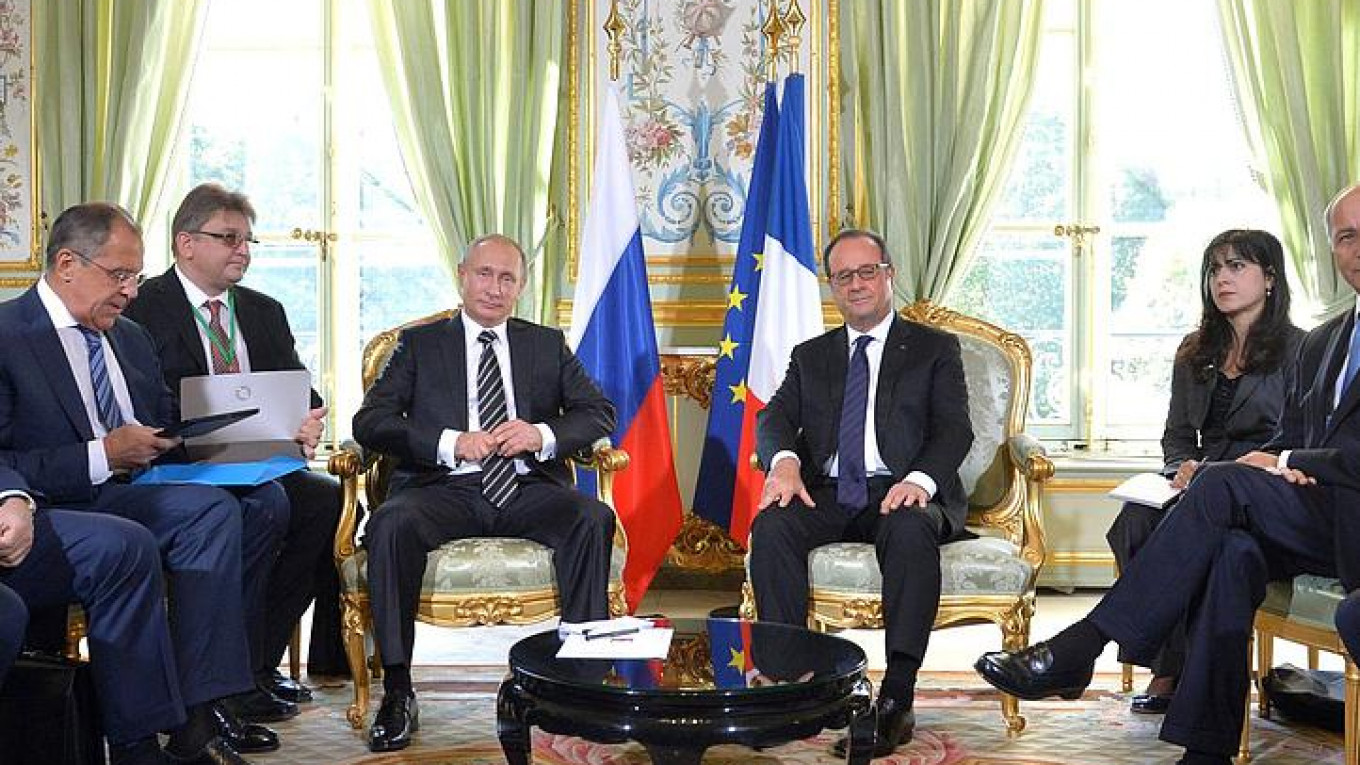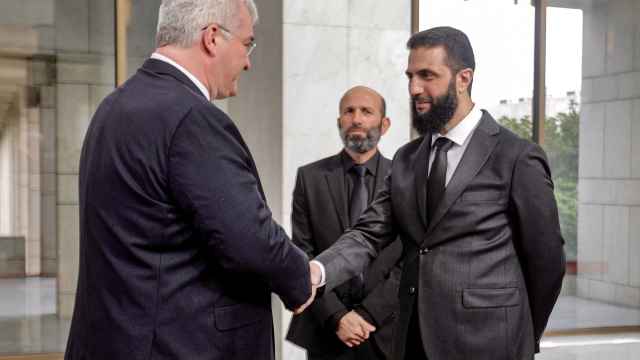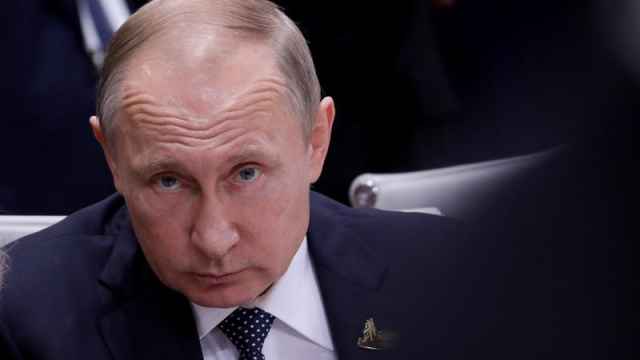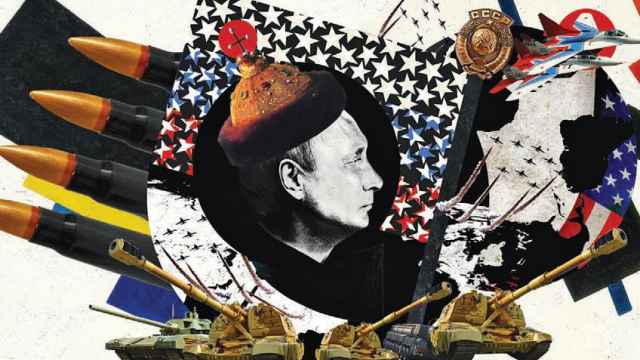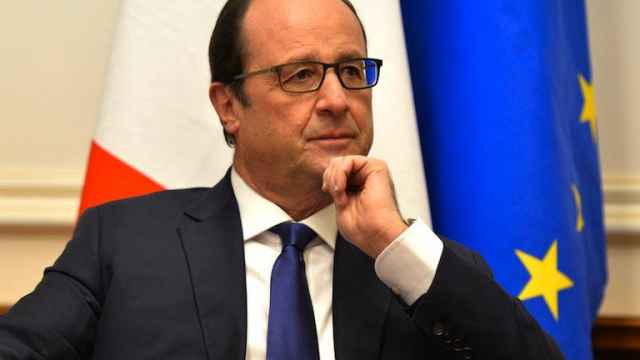With Barack Obama and Angela Merkel stepping up pressure on Russia, French president Francois Hollande was always Vladimir Putin’s safest bet and closest friend.
It was, after all, the Frenchman who stopped off to talk to Putin in Moscow at the height of military actions in Donbass in December, 2014. A year later, following the Bataclan terrorist attack in Paris, the French president chose Moscow as the place to talk common counterterrorist strategy. And, according to Pavel Chinsky of the Franco-Russian Chamber of Commerce, not a single French company left Russia during the crisis.
Yet today, Russian-French relations are in an uncertain state, threatened by the dramatic cancellation of Putin’s October 19 state visit to Paris.
The state visit was a year in preparation. Aside from negotiations on Syria in the Elysee Palace, the Russian president was due to open a new extravagant Russian Orthodox Church on Quai Branly, close to the Eiffel tower. Nicknamed by locals “Saint Vladimir”, the cathedral had been at the center of political, financial and architectural rows in Paris for some 8 years.
Putin was also scheduled to pay a visit to a new Russian avant-garde exhibition in the Pompidou Center, which had been donated to the museum by Russian oligarch Vladimir Potanin.
But it was not to be. After Moscow’s veto of a French resolution at the UN, which called for end to the bombing of eastern Aleppo, it would have looked indecent for Hollande to meet with Putin. The French president had little choice but to reverse out of the meeting, said political analyst Vladimir Frolov.
France re-evaluated and downgraded the terms of the visit. Hollande would still talk Syria with Putin at the Elysee, diplomats said. But the French president would not participate in the opening of the Russian cathedral. In an interview on French television on Monday October 10, the president himself also publicly intimated that Russia could be responsible for war crimes in Syria, and questioned whether the the visit was right in the circumstances.
In Russian eyes, all of this amounted to humiliation, says political analyst Mikhail Troitsky. So Moscow cancelled, or, rather, “postponed,” the visit. Diplomats in Paris exhaled with relief. Putin’s spokesman Dmitry Peskov insisted Putin had “no problems” with the cancellation.
Soon enough, several French politicians came to the Kremlin’s defense. Former Prime Minister Francois Fillon said that Hollande should “naturally” have welcomed his Russian counterpart. Thierry Mariani, who controversially led two delegations of French parliamentarians to Russian-annexed Crimea, told Russia Today that Hollande had made himself the “stooge of American politics”.
Of itself, the incident is unlikely to have any significant impact on the Syrian crisis or Russia’s with the West. “The situation simply can’t get much worse,” explains Frolov.
In a parliamentary debate on the Syrian crisis, the UK government backed the French demarche in the strongest terms. Foreign Secretary Boris Johnson said Russia was “in danger of becoming a pariah nation.” His Conservative colleague, the former cabinet minister Andrew Mitchell, MP, compared the Russian-backed bombardment of Aleppo with the Nazi bombing of Spanish town of Guernica during the Spanish Civil War in 1937.
Russia’s public poise doesn’t appear to be too threatened by developments, however. If anything, it looks as if Moscow is deliberately upping the ante. On Tuesday, 11 October, Reuters reported that Russian jets had resumed heavy bombing of eastern Aleppo — this after several days of relative calm.
The New Cold War is now no longer a lazy figure of speech, suggested political expert Andrey Kolesnikov in an op-ed for the RBC newspaper: “The Russian President is scheduling a Cold War of a new type, and distinct from the previous incarnation, when both sides kept nuclear weapons but understood the impossibility of using them”.
One other possible entry in Vladimir Putin’s schedule are Normandy format talks on Ukraine, now due to take place in Berlin on the same day as the cancelled state visit.
The talks were suggested by Angela Merkel, but it is yet to be seen if they will go ahead.
A Message from The Moscow Times:
Dear readers,
We are facing unprecedented challenges. Russia's Prosecutor General's Office has designated The Moscow Times as an "undesirable" organization, criminalizing our work and putting our staff at risk of prosecution. This follows our earlier unjust labeling as a "foreign agent."
These actions are direct attempts to silence independent journalism in Russia. The authorities claim our work "discredits the decisions of the Russian leadership." We see things differently: we strive to provide accurate, unbiased reporting on Russia.
We, the journalists of The Moscow Times, refuse to be silenced. But to continue our work, we need your help.
Your support, no matter how small, makes a world of difference. If you can, please support us monthly starting from just $2. It's quick to set up, and every contribution makes a significant impact.
By supporting The Moscow Times, you're defending open, independent journalism in the face of repression. Thank you for standing with us.
Remind me later.


